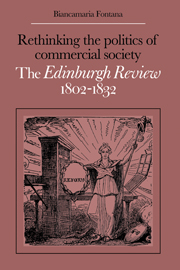Book contents
- Frontmatter
- Contents
- Preface
- Introduction
- 1 Scottish theories of commercial society and the French revolution
- 2 Adam Smith's heritage: the Edinburgh reviewers and the Wealth of Nations
- 3 The definition of political economy: political economy as a social science
- 4 The Edinburgh reviewers and the Whig party
- 5 Commercial society and its enemies: the debate on the First Reform Bill
- Conclusion
- Notes
- Bibliography
- Index
- Frontmatter
- Contents
- Preface
- Introduction
- 1 Scottish theories of commercial society and the French revolution
- 2 Adam Smith's heritage: the Edinburgh reviewers and the Wealth of Nations
- 3 The definition of political economy: political economy as a social science
- 4 The Edinburgh reviewers and the Whig party
- 5 Commercial society and its enemies: the debate on the First Reform Bill
- Conclusion
- Notes
- Bibliography
- Index
Summary
What, then, had become of ‘philosophic Whiggism’ by 1832? To what extent did an intellectual tradition which had, after all, been profoundly provincial and idiosyncratic in its origins, achieve an enduring impact on the culture of 19th-century Britain?
There are two different angles from which this question may be approached. The first is the success of the efforts of the reviewers as a group and the influence which the Review itself attained as an ideological and political medium. The second is the importance of the views which they developed in their protracted assessment of the politics of commercial society.
If we attempt to draw up a balance sheet of the reviewers' personal achievements, we are confronted with a somewhat puzzling combination of failure and success. On the one hand it is reasonable to claim that the founders of the Review fell short of their early intellectual ambitions in that they never produced, in any of the fields to which they applied their talents, a comprehensive and durable contribution comparable with those of their 18th-century Scottish mentors. The case of political economy is of course the most apparent since it was precisely in this field that the reviewers came closest to possessing a genuinely exclusive expertise. As we have seen in our survey of early-19th-century interpretations of the Wealth of Nations, not only did the reviewers fail to produce a new theoretical synthesis to correct and develop the results of Smith's work, but the Review itself came to be increasingly open to the circulation and promotion of economic doctrines and approaches which were related only very loosely (if at all) to the Smithian tradition.
- Type
- Chapter
- Information
- Rethinking the Politics of Commercial SocietyThe Edinburgh Review 1802–1832, pp. 181 - 185Publisher: Cambridge University PressPrint publication year: 1985

